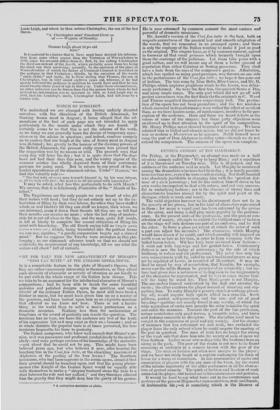"TIT FOR TAT," THE NEW ARRANGEMENT OF MOZART'S "COSI FAN
TUTTE " AT THE ENGLISH OPERA-HOUSE.
IT is a remarkable feature in the plots of Mozart's Operas, that they are either excessively interesting in themselves, or they afford such diversity of character or novelty of situation as are hardly to be met with in the whole range of the Italian lyric drama. This we take to be an argument for the intellectual character of Mozart's compositions : had he been able to lavish the same beautiful melodies and polished designs upon the spiritless and vapid libretti of the ordinary Italian Opera, he must still have been a thinker in music, but we must have given him up as a master of the passions, and have looked upon him as an exquisite machine that affected us we know not how. There is not a harder thing in the world than to settle a man's pretensions as a
lc A corruption doubtless of chvice,
dramatic musician. Nothing less than the acclamation of kingdoms or the award of posterity can decide the question. The musician has no type, nor have the audience any test of the truth of his expression but as it may exist in their owa bosoms ; and as in whole districts the popular taste is at times perverted, the true musician bequeaths his fame to posterity.
The Italian composers, who knew well enough that Mozart's ge- nius, as it was passionate and profound, tended chiefly to the melan- choly—and were perhaps envious of his knowledge of the orchestra —put about that he could not be gay. This might have been believed years ago, but who believes it now, after hearing the laughing trio in the Cosi fan tulle, or the chuckling merriment of Alphonso at the parting of the four lovers ? The Southern musicians, who had been supreme in the comic opera, dreaded that their ground should be trenched upon, and that the young pheno- menon (the Knight of the Golden Spur) would be equally able with themselves to make a "sleeping husband snore the bass to a duet between his wife and her gallant ;" and they therefore allowed him the gravity that they might deny him the gaiety of his genius. He is now esteemed by common consent the most various and powerful of dramatic musicians. Mr. Arnold's version of the Cosi fan tulle is the best, both as respects correctness of the musical text and smooth adaptation of the words, that we remember in an arranged opera ; and there is only the euphony of the Italian wanting to make it just as good as the original. The singers have, as if by common consent, agreed to forswear all that vocal grimace which formerly brought upon them the contempt of the judicious. Let them take pains with a good author, and we will insure any of them a better ground of reputation than either Catalani or Sontag possesses. They shall have a halo from the rays of the composer's genius. Affectation, which has spoiled so many good passages, was thrown on one side in the performance of the Cosi fan tulle; we hope it has gone out of fashion. The trio sung by Miss Betts, Miss Cawse, and Mr. ii. Phillips, which implores propitious winds to the lovers, was delici- ously performed. So were the first trio, the quintett Sento o' Dio, and many single songs. The only part which did not go off with perfect correctness was the first finale (to the original) in C. Wood and Thorne acquitted themselves surprisingly. well. The produc- tion of the opera has not been premature ; and the few mistakes winch occurred in its performance were rather the effect of accident than, as we have known some, of' carelessness, insulting to the per- ception of the audience. Here and there we heard defects in the voices of some of the singers : but these petty objections were swallowed up in their attention to the spirit of the composition. Mr. Henry Phillips never showed to greater advantage. We have admired hint in ballad and church music, but we did not know he was so zealous a Mozartean as he appears. Naldi himself never sang the part of Don Alphonso in richer voice—though we do not extend the comparison. The success of the opera was complete.


















 Previous page
Previous page